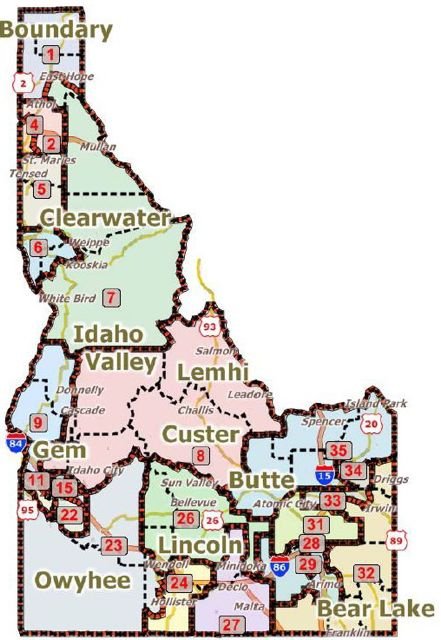The Idaho Legislature, which has before it a bill that would move the state's long-running May primary election to August, might as well go ahead and pass it. Candidates and election officials will need the time, because the odds now are that no new legislative redistricting plan will be adopted in the short term - and that it will be done not by the redistricting commission but by the Idaho Supreme Court.
It didn't seem that way for quite a while. But here we are - or likely soon will be.
This becoming a long and tortured story, let's recap. Redrawing of legislative and congressional districts in Idaho is the job of a six-member (three from each party) redistricting commission, which was appointed last spring and got to work. After many hearings, work sessions and other activities, that group did approve a congressional redistricting (which only barely changed the current districts) but did not quite manage to agree on a legislative plan. It came close; most of the issues were resolved. But just a few were not, and the commission's deadline passed without a plan formally approved. (Informally, they approved one a couple of weeks later, but it had no official effect.)
So a second commission, made up of new members, was appointed to replace the first, with the first meeting held in September and the deadline clock reset to December 13. As with the first, the commission members were appointed by the state Republican and Democratic state party chairs and highest ranking officers in the state Senate and House. Much of the research and public hearing work already done, this half-dozen got directly to the maps and made a bipartisan agreement on a legislative map, and then adjourned.
That might have been the end of it. But monkey wrenches appeared. The plan became the subject of lawsuits (two, one from North Idaho and one based around Twin Falls County), and last week the Idaho Supreme Court decided the Twin Falls argument had enough merit to throw out the commission's map and order the commission back to work to draw a new one.
New problems arose from this. One, not much mentioned but possibly significant, is that the state law should seem to indicate that the last redistricting commission became defunct as of December 13. (The Supreme Court did not address that question about whether a current commission even exists.)
Assuming, however, that it still does, a meeting has been called for it this Thursday at the Statehouse, to include its existing six members. But here too there's a problem. Speaker of the House Lawerence Denney and Idaho GOP Chairman Norm Semanko said last week that they want to replace two of the Republican members of the commission (Dolores Crow and Randy Hansen, both conservative Republican former legislators) evidently on grounds that they were insufficiently protective of Republican Party interests.
The Idaho Attorney General's office then issues an informal report saying that Denney and Semanko lacked legal authority to fire Crow and Hansen and replace them. Today, Denney and Semanko released a private informal legal opinion arguing that they do have such authority. This too looks to be destined to be a Supreme Court case.
That brings us up to date, so let's game this out.
The odds seem to favor new commission members. Whether Denney and Semanko will prevail on their view of the law is unclear, but there's a fair chance that either they will, or that the current commission will be held to have been disbanded by the December 13 deadline, and so six new members have to be appointed anyway. If they are, the odds are that they will not be in a compromising frame of mind, which will make producing any plan (which needs votes from both parties to pass) more difficult. Even if it wasn't dealing with new Supreme Court mandates. This whole cluster of issues is unlikely to be settled within the next few weeks.
It may not be settled at all, in terms of a commission-produced plan. If it does not deliver a plan, the job will go to the Idaho Supreme Court, which will.
This is in all not a super-speedy process. It will take a couple of months at best, and maybe more.
Probably the commission, whatever its composition, would be best off to throw up its hands and say: "Justices, it's all yours."
And get the candidate filing and primary election schedule moved back a few months accordingly.



